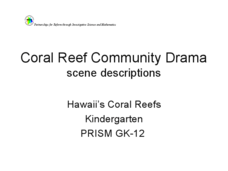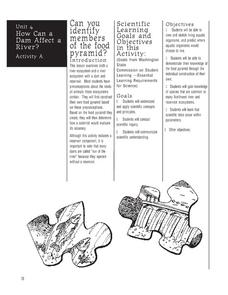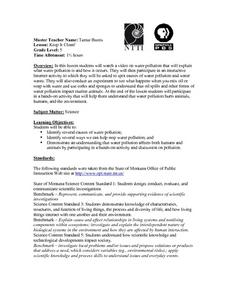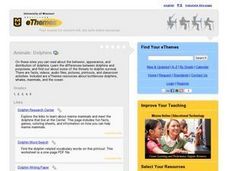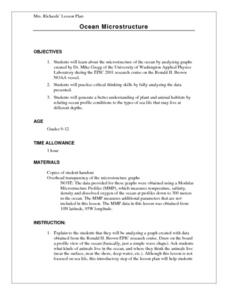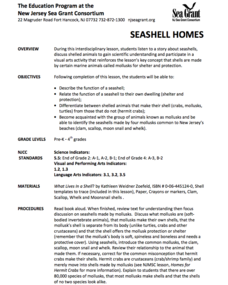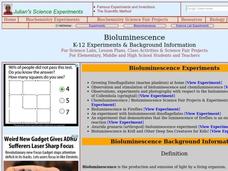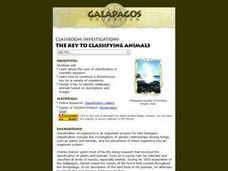Curated OER
Coral Reef Community Drama: Scene Description
Students are organized into groups and are assigned puppets according to what sea creature their group represents. In this reef lesson, students identify sea creatures according to their place in the food chain then discuss how these...
Curated OER
Wildlife
The centerpiece of this lesson plan is a predator-prey simulation in which colored paperclips represent different species of animals camouflaged against a colored background. Relevant follow-up questions are provided. The activity is...
Foundation for Water & Energy Education
How Can a Dam Affect a River? Activity A
Written for Washington state students in life science, this lesson provides an opportunity to examine the residents of local freshwater habitats. You or the class collects a water sample, and learners try to examine what organisms live...
Curated OER
Keep It Clean!
Fifth graders investigate the how water becomes polluted and how it effects the environment, animals, and humans. They watch a video and conduct experiments.
Curated OER
Raccoon Grid Drawing Page
In this raccoon drawing instructional activity, 1st graders will draw the raccoon by copying a square from a grid on page 1 to the blank grid on page 2.
Curated OER
Ecosystems
In this ecosystems worksheet, students complete a crossword puzzle with 35 questions about the different types of ecosystems and organisms in them.
Curated OER
Identifying Sea Ice
Young scholars study different types of sea ice and interview an Yupik elder or local hunter. In this sea ice lesson, students study the native language for sea ice terms. They interview an elder from Alaska's northern coast about their...
Discovery Education
Sonar & Echolocation
A well-designed, comprehensive, and attractive slide show supports direct instruction on how sonar and echolocation work. Contained within the slides are links to interactive websites and instructions for using apps on a mobile device to...
Curated OER
The Wonderful World of Slugs
Examine a slug? Of course, what else would a 2nd grader do with it? Pupils use clues and go on a slug hunt, read a slug story, or make a cooperative group mural of a slug's habitat. While older learners catalog slugs, go on a slug hunt,...
Curated OER
Animals: Dolphins
Students use the internet to discover information about dolphins. They examine their behavior, appearance and distribution of dolphins.
Curated OER
Seas Of Life
Students brainstorm examples of predator and prey that are featured in a video they watch. In this investigative lesson students will research an animal from the video and explain if it is a predator or prey and how it helps...
Curated OER
Ocean Microstructure
Students assess the ocean's microstructure by analyzing graphs created during tne Ronald H.Brown research cruise. they discuss at what depths various sea animals live and write paragraphs on data analysis from the graphs.
Curated OER
Twisted Vision
Students explain polarization vision and why some animals have it while others do not. They examine the reasons why it would be helpful for marine organisms to have polarized light.
Curated OER
Sunken Hazard
Young scholars use information about past oil spills to predict potential effects of the Prestige spill on the environment, on marine life, and on the human culture and economy of Spain.
Curated OER
Jelly Critters
Pupils compare and contrast three different organisms that are considered gelatinous zooplankton. They describe how they fit into marine food webs.
Curated OER
Stranded along the Coast
Students plot stranding sites onto a map using latitude and longitude as well as compass directions with respect to coastal features. They identify several species of marine animals that might become stranded; distinguish their...
Curated OER
Turtle Sightings
Third graders research turtles and the ways they have adapted to their marine environment. They work in groups and publish their findings using SiteMaker a web-authoring tool.
Curated OER
Seashell Homes
Pupils listen to a story about seashells. They discuss shelled animals. Learners describe the function of seashell. Pupils relate the function of a seashell to their own dwelling. They differentiate between shelled animals that make...
Curated OER
SPLASH – Monitoring Humpback Whales
Middle schoolers view a video about the humpback whale and why it is endangered. In this endangered species lesson, students recognize the importance of observing and following an endangered species in an ecosystem. Middle schoolers...
Curated OER
Under the Sea
Students identify and interpret that non-fiction books have features like a table of contents, a glossary, and an index, which can efficiently help them find information. They also identify how to narrow the search for information by...
Curated OER
Land Plants and Algae
Students compare and contrast algae and land plants. In this plant lesson plan students discover what algae and land plants require for growth. The students discuss experimental design. The students experiment with different treatments...
Curated OER
How about a Little Give and Take?
Students design a closed system to test the relationships between plants and animals. They monitor abiotic fluctuations within this living system by using a chemical test kit. They observe how living organisms respond to fluctuations in...
Curated OER
Bioluminescence
Students differentiate chemiluminescence from bioluminescence. For this biology lesson, students explain how fireflies and other animals emit light. They discuss the applications of engineered bioluminescence.
Curated OER
The Key To Classifying Animals
Explorers of the environment construct a dichotomous key for a variety of organisms and design a key to classify Galapagos animals based on descriptions and images. The activity includes a link to an animal gallery and the worksheet for...
Other popular searches
- Marine Animal
- Marine Animal Reproduction
- Marine Animal Taxonomy Game
- Marine Animal Games
- Marine Animal Adaptations
- Marine Animal Classification


